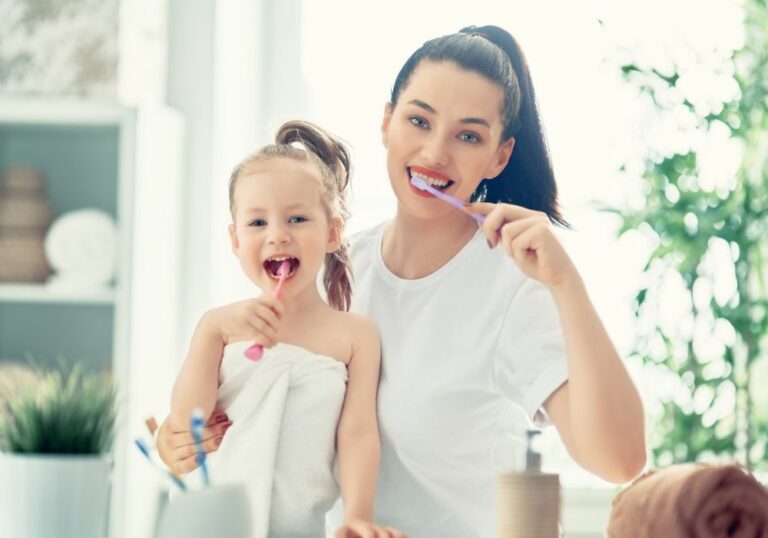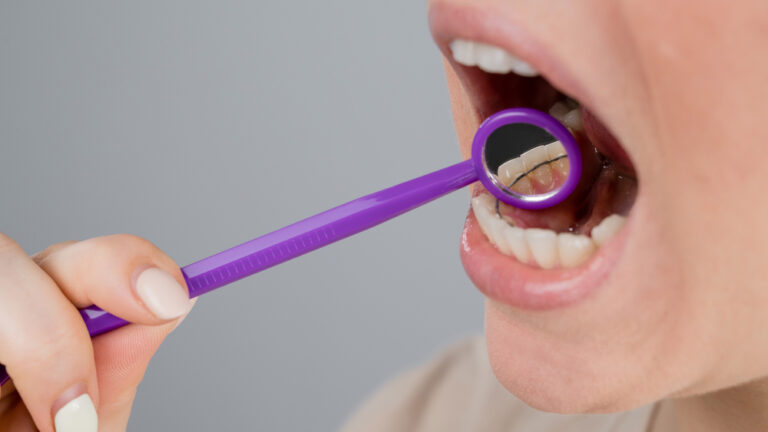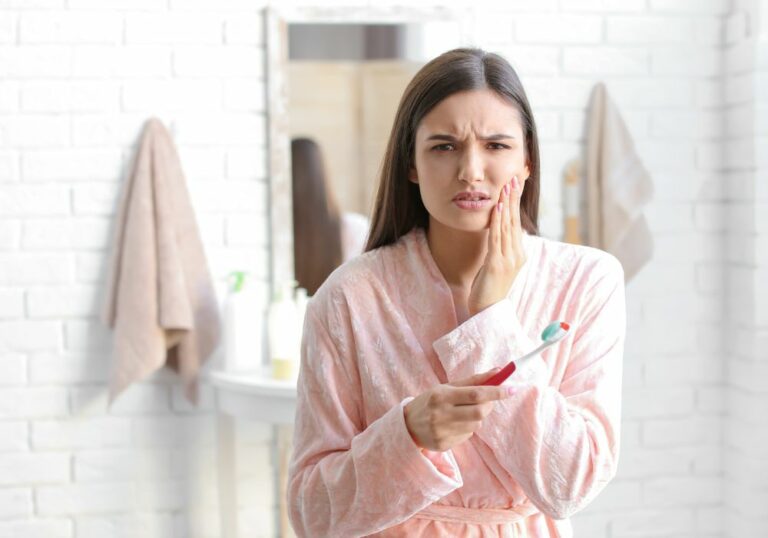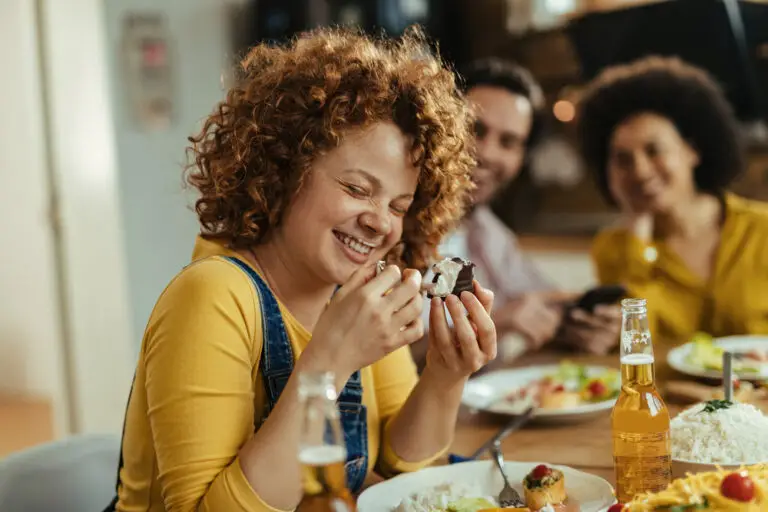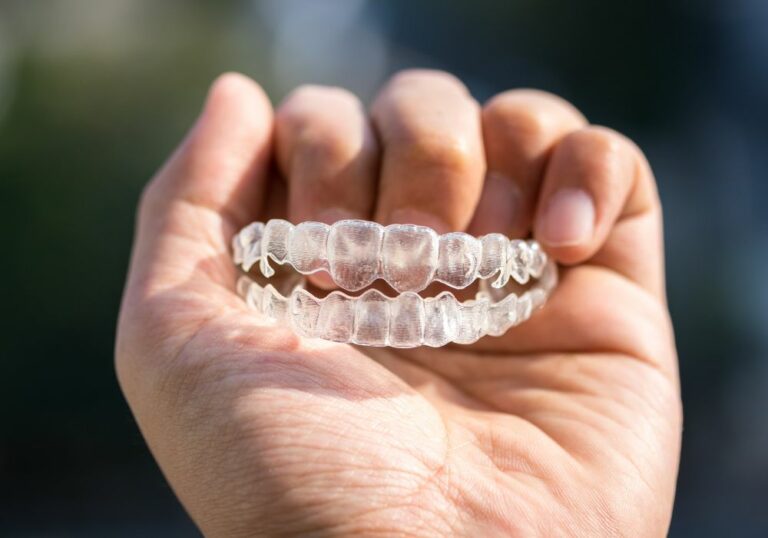Sparkling white teeth are considered by many to be an attractive attribute. No wonder the teeth whitening industry has exploded in recent years. With so many over-the-counter kits and solutions available, it’s easier than ever to brighten your smile. However, for those who enjoy an occasional glass of wine or cocktail, a common question arises – can you safely drink alcohol while undergoing teeth whitening treatment?
This article provides an extensive look at the effects of alcohol on whitening, risks and precautions to take, and tips for keeping your smile vibrant.
How Does Alcohol Impact Whitening?
There are several ways that alcohol can interfere with the teeth whitening process:
Pigment and Dye Absorption
Enamel is porous, which allows stains to penetrate into the microscopic pits and fissures in the tooth surface. Alcohol provides a means for deeply embedded intrinsic stains to leach out of the dentin and become darker extrinsic stains on the enamel exterior. This is especially true of red and purple anthocyanin pigments found in red wines. Over time, alcohol enables deposits of chromogens that dull and darken the color of the teeth.
Enamel Dehydration
Tooth enamel needs to maintain proper hydration levels to retain luster and whiteness. Alcohol is dehydrating to oral tissues, as are acidic mixers like citrus juices and carbonated beverages. This dries out the enamel surface, making teeth look darker and promoting stain adhesion. Saliva also becomes diminished and loses its cleansing action.
Acidic Erosion
The low pH of alcoholic drinks erodes the enamel crystal surface over time. This degradation makes the teeth more porous and reveals darker underlying dentin, particularly at the gumline. Acidic erosion also roughens the enamel, creating more surface area for stains to cling to.
Oxidation Disruption
Many whitening agents like carbamide peroxide or hydrogen peroxide work via an oxidation reaction that breaks up and lifts pigment molecules. However, some ingredients in alcoholic drinks have an antioxidant effect that interferes with peroxide activators. This can slow or prevent oxidation whitening chemistry.
Gumline Irritation
Alcohol commonly irritates the gingival margins, causing inflammation, redness, and swelling of the gums surrounding the teeth. This provides crevices for stains to accumulate readily in. Irritation also facilitates penetration of chromogens into dentin tubules exposed at the gum line.
Fatigue of Whitening Materials
During professional in-office power whitening, the active peroxide gel is in place against the teeth for an extended period under hot lamps. This can fatigue the material. Alcohol consumed soon after may allow some reversal of oxidation due to its interaction with ingredients.
What Are the Risks of Combining Alcohol and Whitening?
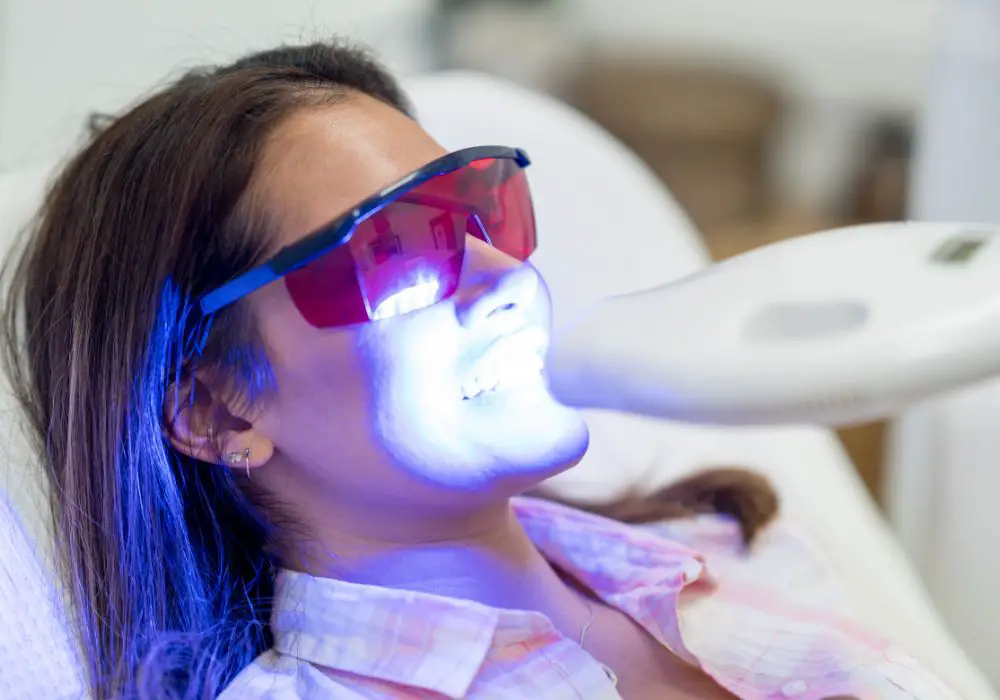
Because alcohol impacts the teeth and mouth in so many ways, there are some potential ramifications of drinking while trying to whiten your teeth:
Discoloration Relapse
One of the biggest risks is that the stains removed by oxidation during the whitening treatment are rapidly redeposited into the enamel pores, dentin, and even bonding materials. This reverses the brightening effect achieved during bleaching.
Post-Whitening Staining
Teeth are especially vulnerable to restaining for 48 hours after whitening before the pores remineralize and seal. Alcohol during this critical rehydration period can readily penetrate the enamel and lead to renewed discoloration.
Tooth Sensitivity
Bleaching agents already irritate nerves and tissues, making them hypersensitive. Alcohol compounds this effect, causing more pronounced sensitivity, pain, and discomfort of the teeth and gums. This is exaggerated in those already prone to sensitivity.
Gingival Inflammation
The action of alcohol on the gingival margins leads to swollen, angry, and reddened gums. This can be painful but also allows more rapid staining along the gumline and between teeth.
Corroded Dental Work
Crowns, veneers, fillings, and other dental work can be damaged by peroxide whiteners. Drinking alcohol during treatment accelerates the breakdown of dental materials and bond lines. This allows staining underneath restorations.
Chemical Burns
In rare cases, using alcohol while whitening trays are still in the mouth can trap and concentrate peroxide, causing chemical burns or ulcerations on the gingiva, tongue, lips, or cheeks. This is especially true with high concentration in-office whitening gels.
Aspiration and Choking
Attempting to drink alcoholic or any beverages with dental trays still in place raises the risks of gagging, choking, and accidentally aspirating or swallowing the trays or gel. Removing trays prevents this.
Tips for Drinking Alcohol During Whitening Treatments
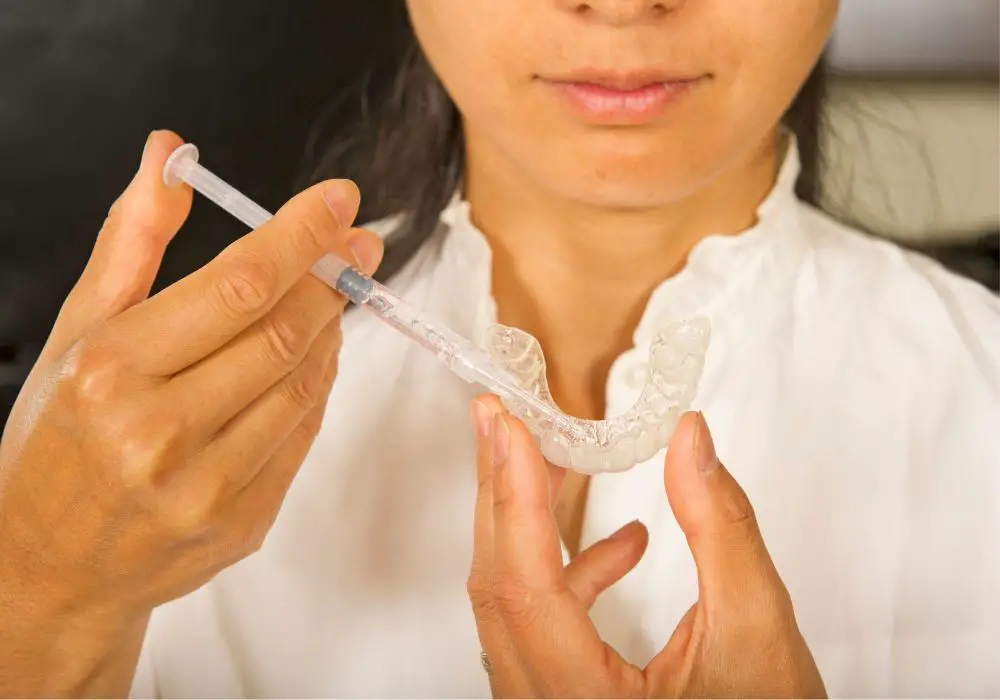
If you are unwilling to give up alcohol completely during teeth whitening, there are some damage control tips to follow:
- Drink dark or pigmented beverages like red wine ONLY with a straw to minimize contact with teeth.
- Rinse your mouth thoroughly with water after consuming any alcoholic drinks to dilute staining pigments.
- Swish with an over-the-counter mouthwash containing hydrogen peroxide to counter restaining.
- Limit alcoholic intake to 1 or 2 standard servings per day and avoid binge drinking dark liquors.
- Opt for clear liquors like vodka and gin which cause less staining. Avoid barrel-aged drinks.
- Select non-acidic mixers like seltzer, soda water, or lemon-lime soda – NOT juice.
-Always remove dental whitening trays before imbibing any beverage including alcohol.
- Give your teeth a touch up whitening treatment a couple days after drinking to counter any staining.
- Abstain from alcohol consumption for 48 hours before and after the final whitening treatment.
- Stay hydrated by drinking a full glass of plain water for every alcoholic drink consumed.
Bleaching Options That Accommodate Alcohol
Here are some teeth whitening options for those unwilling to give up alcohol:
Wait Until After Treatment
Simply postpone drinking alcohol until after completing the prescribed whitening regimen. This allows the bleaching effect to fully stabilize before exposing teeth to staining risks.
Alternate Whitening Schedule
Plan whitening sessions around occasions when you anticipate drinking alcohol, such as parties or vacations. Take a hiatus from bleaching agents during those events.
Spot Whitening Treatments
Only whiten the 12 to 16 teeth most visible in your smile rather than the entire arch. This allows you to still drink dark liquors and wine while limiting whitening efforts to the front visible zones.
Self-Managed Touch Ups
Invest in take-home whitening kits to do periodic touch up treatments after drinking alcohol to reinforce results as needed. This provides bleach if stains occur.
Other Cosmetic Options
Consider alternatives like dental bonding, porcelain veneers, crowns, or implants to cosmetically mask innate stain tendencies while still allowing red wine enjoyment. But maintain diligent oral hygiene.
Routine Dental Cleanings
Schedule professional cleanings every 3 to 4 months for stain removal instead of relying solely on chemical bleaching. Use peroxide occasionally for added brightening in between visits.
Frequently Asked Questions About Alcohol and Whitening
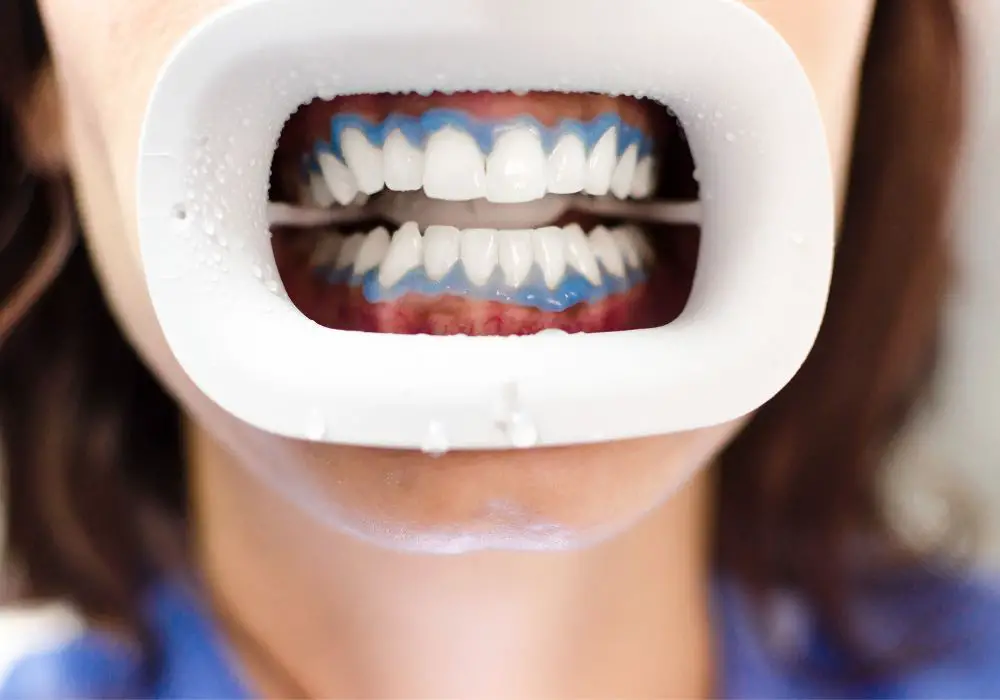
Here are answers to some of the most common questions about drinking alcohol during teeth whitening treatment:
Can I drink clear alcohol like vodka or gin while whitening?
Clear liquors are less staining than dark alcohols or red wine and may be consumed in moderation during whitening. However, all alcohol poses some risk and is best minimized or avoided completely.
Is it OK to drink alcohol with my trays in while whitening?
No, you should always remove dental whitening trays before consuming any beverage, including alcohol. Trapping bleaching gel and alcohol under the trays increases irritation and other dangers.
How long should I avoid alcohol before and after whitening treatments?
Ideally, refrain from alcohol for at least 48 hours prior to and following whitening sessions. This prevents rebound staining and allows the bleach oxidation effect to fully stabilize.
Can I drink alcohol immediately after having my teeth whitened?
It’s advisable to avoid alcohol for two hours after whitening treatments to allow the peroxide gel to completely dissipate and the teeth to rehydrate. Swish water before imbibing drinks.
Will a few drinks truly undermine my expensive professional whitening treatment?
While a night of heavy drinking can negatively impact results, moderate alcohol intake normally will not completely reverse professional bleaching procedures. But refrain initially and avoid dark liquids.
The Takeaway
While excessive alcohol consumption combined with bleaching agents is inadvisable, an occasional glass of wine or cocktail during teeth whitening is acceptable with some precautions. Try to time whitening sessions around social drinking events. Rinse diligently after alcoholic drinks. And utilize touch up treatments and dental visits to maximize and maintain your bright smile!

